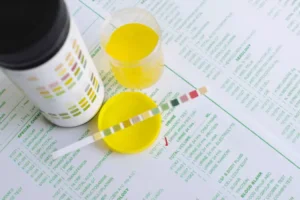A large quantity of dopamine accumulates between neurons (within the synaptic cleft) when a person smokes crack or uses cocaine. Upon accumulation of dopamine between synapses, this transient dopaminergic spike allows the user to feel an extreme sense of pleasure, focused, and stimulated. The high that is obtained from smoking isn’t typically long lasting (10 to 15 minutes) compared to that of snorting (20 to 30 minutes). Springbrook Psychiatric Hospital is a 66 bed inpatient mental health facility located in Hernando County. We offer 24-hour psychiatric services provided by licensed professionals in various disciplines.
Dependence Rating: 2.82
- For instance, some strains have higher levels of CBD, a compound known for its therapeutic benefits without inciting a feeling of being high.
- Alcohol abuse can lead to physical dependence and addiction when users start relying on the substance to increase the brain’s release of endorphins.
- Nicotine is a highly addictive substance that is found in cigarettes and other tobacco products.
Methadone treats more severe conditions that don’t respond well to non-opioid treatments. This makes it a viable option for people with cancer or others facing terminal illness while providing suitable comfort from persistent ache syndromes. Opioids bind with receptors in the brain to block nerve signals between the brain and the body. It allows them to effectively alleviate discomfort, which is why they’re often used to manage chronic pain. “We decided it was healthy to communicate,” says Doherty, keenly aware of his and Barât’s fraught backstory.
The five most addictive substances in the world
Join 40,000+ People Who Receive Our Newsletter Get valuable resources on addiction, recovery, wellness, and our treatments delivered directly to your inbox. In the US, 28.3 million people over the age of 12 qualify as having an alcohol use disorder. In the US, 2.7 million people over the age of 12 qualify as having an opioid use disorder. In the US, 1.4 million people over the age of 12 reported having a cocaine use disorder. In 1997, Former Director of the National Institute on Drug Abuse, Dr. Alan Leshner, suggested that addiction be defined as a “chronic, relapsing brain disorder” and, therefore, be viewed as a brain disease. Nicotine acts on the reward circuitry in the brain after being absorbed through the mucosal lining of the mouth and nose, through the lungs, or through the skin.
Statistics on Addiction to Specific Substances
Fentanyl AnalogsThis includes carfentanil, acetylfentanyl, and other synthetic opioids that are more potent than morphine and have a high potential for fatal overdose. Kratom is a plant native to Southeast Asia that has psychoactive properties. Benzodiazepines such as Valium, Xanax and Klonopin increases the effectiveness of GABA, the brain’s “nerve calming” agent. (For once, we’re not talking about dopamine!) Alcoholics Anonymous And, as usual, the body tries to compensate for the increase of GABA by lowering the sensitivity of GABA receptor cells.
- Many cultures serve alcohol as part of celebrations, and many public gathering places serve alcohol to promote a social atmosphere.
- Family therapy and involvement can also be beneficial in repairing relationships and creating a supportive environment.
- Fear over rising rates of heroin use and addiction are well-founded; heroin hits the addiction trifecta.
- While effective in the short term, Xanax carries the risk of abuse, dependence, and withdrawal symptoms if used improperly or for extended periods.
- An older person who has imbibed alcohol for decades may have a sudden reaction when given an especially strong drink.
The 10 Most Addictive Drugs in the World
The stimulating high from amphetamines is created when the drug alters neurotransmitter signaling in the reward pathways and executive areas of the brain. Over time, dopamine receptors become depleted and the brain’s baseline levels of dopamine drop. It takes a significant amount of time for the dopamine and dopamine receptors to restore themselves. It tends to have a direct effect on cholinergic receptor activity and is thought to influence neurotransmission of dopamine and production of epinephrine. The degree to which it affects dopamine is thought to improve cognition, increase relaxation, and give the user a slight “buzz” characterized by slight euphoria. As a person continues to smoke, their receptors become desensitized to the chemical, and people experience “cravings” for the buzz that they get from the nicotine.
As the body continues to adapt, tolerance builds quickly, and when tolerance is high, quitting gets harder. Worse, methamphetamine can damage the dopamine and norepinephrine-releasing neurons, leading to a drastic decrease in their production. When opioid use disorders are related to pain, CBT can even help people manage their pain in healthy ways. One of the most effective tools that addiction therapists and other mental health professionals have to help someone change unwanted behavior is CBT.
Comparisons with Less Addictive Substances
Cocaine gives the user an intense high that is characterized by euphoria and stimulant effects on the central nervous system. Those who smoke crack are likely to feel increased social confidence, energetic, more alert, and in some cases, as if they are on top of the world. These effects are achieved by the drug acting as a dopamine reuptake inhibitor, particularly via blocking https://ecosoberhouse.com/ the dopamine transporter. There are many contributing factors to the development of alcohol addiction.
Crack Cocaine
- The plant contains compounds called cannabinoids, with delta-9-tetrahydrocannabinol (THC) being the primary psychoactive component responsible for the plant’s mind-altering effects.
- Fentanyl is the primary driver for the third wave of the U.S. opioid epidemic.
- Alcohol withdrawal is also among the worst of all drug withdrawals, so severe it could cause death.
- Amphetamines are common stimulants of the central nervous system that can be used recreationally to achieve a buzz, but are medically used to treat ADHD and wakefulness disorders such as narcolepsy.
- Methadone has some medical benefits, which include its ability to treat ADHD, obesity and to taper off of heroin addiction.
When benzos initially came out, they were marketed as a safe alternative to highly addictive barbiturates. Individuals who abuse benzos rely on these prescription drugs to feel calm which puts them at risk of addiction and overdose. Benzodiazepines, also known as “benzos,” are a class of drugs that are commonly prescribed to treat anxiety, insomnia, and seizures. They work by increasing the activity of a certain neurotransmitter called GABA in the most addictive drug brain, which leads to a calming effect. In addition to the potential for addiction, the effects of cannabis can vary significantly based on the strain, method of consumption, and individual biology. For instance, some strains have higher levels of CBD, a compound known for its therapeutic benefits without inciting a feeling of being high.





